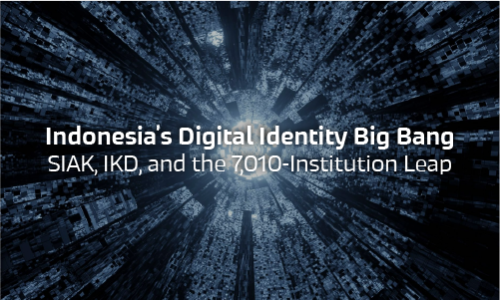
Summary: This article examines Indonesia’s ongoing digital transformation of civil registration and identity services through five interlocking pillars: (i) a centralized Civil Registration Information System (SIAK); (ii) expanded online service delivery; (iii) certified electronic signatures for document legalization; (iv) the Digital Population Identity (IKD) application as a mobile representation of the e-KTP; and (v) cross-sector reuse of population data. Drawing on the government’s rollout trajectory, the analysis highlights early adoption of IKD (6.53%) with targets of 10% (2025) and 50% (2029), alongside integration agreements with 7,010 institutions as of April 2025, including local governments, banks, and educational bodies. The centralized architecture enables a continuously updated “single source of truth,” while online channels and e-signatures reduce transaction costs, queues, and forgery risk. Four critical challenges are identified: uneven infrastructure and digital literacy, dependence on central systems and service resilience, security and privacy risks (including social-engineering scams), and operational consistency across jurisdictions. To address these, a two-year roadmap is proposed: zero-trust security with active-active data centers and immutable backups; standardized user experience via a national design system and PWA/“offline-first” capabilities; strengthened data governance with comprehensive logging and proactive audits; inclusive, assisted-digital support; and targeted ecosystem partnerships (school enrollment, primary healthcare access, banking e-KYC). If implemented with fidelity, these measures can convert infrastructure gains into tangible welfare benefits through faster service times, higher active IKD usage, fewer incidents, and broader, safer integration across priority sectors.
Population Data Digitalization
Indonesia is entering a pivotal phase of public service transformation by strengthening Civil Registration Administration (Administrasi Kependudukan, Adminduk) and adopting the Digital Population Identity (Identitas Kependudukan Digital, IKD). The agenda rests on five pillars: implementation of a centralized Civil Registration Information System (SIAK); expansion of online civil-registration services; use of Electronic Signatures (TTE) to legalize documents; launch of the IKD application as the digital representation of the e-KTP; and reuse of population data by thousands of cross-sector institutions. IKD began rolling out in 2022 and was formally implemented in 2024. Current user coverage stands at 6.53%, with targets of 10% in 2025 and 50% in 2029. As of April 2025, 7,010 institutions, including local governments, the banking sector, and educational institutions, had concluded data-use agreements. This…











